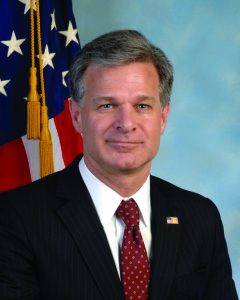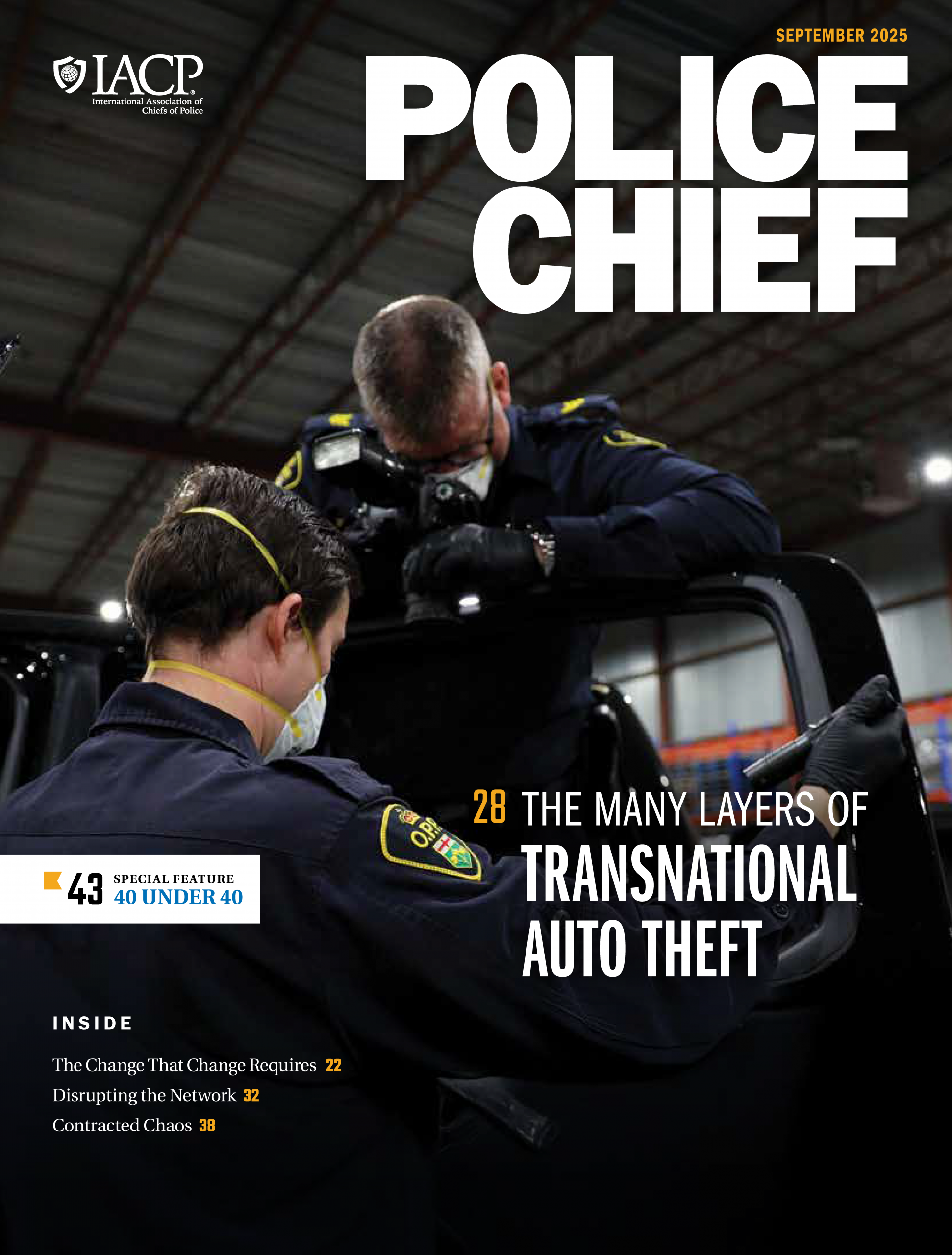While undeniably a tragedy for the people of the United States, the 9/11 terrorism attacks impacted people and governments around the world, changing how countries across the globe prepared for and worked to counter domestic and international terrorism. The members of the Five Eyes intelligence alliance—Australia, Canada, New Zealand, the United Kingdom, and the United States—each took a critical look at the impact of 9/11 on their operations, any positive takeaways, and the evolution of the Five Eyes in the 20 years since the attacks.
Australia—Australian Federal Police

1. What has been the greatest impact on your operation as a result of the 9/11 attacks?
Like the rest of the world, Australia stood watching the tragic events of 9/11 unfold. And, like the rest of the world, we were asking ourselves: How do we stop this from happening again, and how do we stop it from happening here?
The 9/11 attacks placed urgent demands on Australia’s commonwealth government to refocus attention and resources toward possible terrorist-related activity in Australia. The Australian Federal Police (AFP) Counter Terrorism Command was built out of this urgency to focus on this emerging threat.
Our first big test came all too soon. In 2002, terrorists in Bali, Indonesia, bombed a nightclub district popular with Australians and other international visitors, killing 202 people, including 88 Australians. While not on the same scale as the 9/11 attacks, this incident struck close to our hearts and sent further shockwaves through the Australian community. The AFP, with its international reach and mandate for keeping Australians safe at home and abroad, worked with our partners in Indonesia to restore public safety and conduct a massive investigation to find and catch the perpetrators.
These events demonstrated that Australia needed a consolidated, multiagency approach, involving high-level coordination between police, government, community, and stakeholder organizations. We formed the National Counter Terrorism Committee in 2002, and developed a National Counter Terrorism Plan, defining counterterrorism as a shared responsibility of all sectors of society. The same year, we established Joint Counter Terrorism Teams in every Australian capital city, combining the resources of the AFP, state and territory police, the Australian Security and Intelligence Organisation, and other partners. Providing us with national consistency and strategic management of counterterrorism operations in every Australian jurisdiction, these teams continue to remain our front line to responding to and preventing terrorism attacks.
The momentum of counterterrorism response and investigations has continued throughout the next two decades. The threat environment has shifted and diversified, and the AFP’s role has expanded and evolved in response. We have developed or amended legislation and policy strategies and expanded our partnerships to include New Zealand, extending our cooperative framework to counter current and future terrorist threats and consequences. With an emphasis on information sharing and cooperation, agencies became better coordinated with stronger relationships across government. Counterterrorism has become a central part of the AFP’s identity and of the Australian community’s understanding of how we help keep them safe.
2. What are the positive takeaways from this tragedy?
Two decades of international counterterrorism cooperation has, I hope, left Australians safer than ever before. We are now at the stage where our law enforcement response evolves with the threat environment, and we are shaping the environment to get ahead of the threat.
“The past two decades in the aftermath of 9/11 leave us stronger than before.”
The AFP is focusing further on the enduring nature of terrorism. This includes the ongoing management of high-risk terrorist offenders, where courts may decide that individuals present an unacceptable risk to the community, even when they may have concluded a custodial sentence. We are working to counter the radicalization that can lead to violent extremism, especially online, and helping individuals disengage from a path that takes them to that tragic conclusion. The AFP’s Community Liaison Teams engage directly with communities to ensure police have a legitimate voice and are trusted by the community we serve. Our National Security Hotline has made it easier for the community to share information, and many investigations and successful disruptions have occurred as a result of community reporting. New legislation has provided national security agencies, including the AFP, with powers and strategies to protect the community from terrorist acts and to manage individuals who might otherwise do us harm.
Our information and intelligence sharing practices are better than ever, thanks to our strong relationships with partners in Australia and offshore. The AFP’s extensive international network has proved invaluable in this, as well as building capacity with regional partners and learning from them in turn. Strong partnerships, even in conflict zones, have allowed us to collect evidence and intelligence for use in domestic investigations and prosecutions of foreign fighters.
Australia still faces significant risks, but the past two decades in the aftermath of 9/11 leave us stronger than before. We are better at working together, and we have developed better tools to manage issues into the future, rather than reacting to each new crisis anew.
3. How has the Five Eyes evolved in the past 20 years?
Twenty years is a long time in any industry or environment— and no less so in international law enforcement. The great strength of the Five Eyes is that it has endured over this time, while evolving to meet new challenges.
From a law enforcement perspective, the Five Eyes Law Enforcement Group (FELEG) brings us together with a common aim and a common platform, allowing us to each bring our particular expertise, resources, and capabilities to bear on shared problems.
FELEG has diversified its approach to global crime problems, looking for new and innovative ways to deliver lasting damage to the criminal environment. The ability of FELEG to form thematic working groups based around emerging issues or methodologies, such as criminal financing, demonstrates our true strength in working together.
Canada—Royal Canadian Mounted Police

1. What has been the greatest impact on your operation as a result of the 9/11 attacks?
It has been 20 years since the devastating terrorist attacks in the United States of America. It shocked the world then, but it also remains a powerful reminder of how far-reaching terrorist attack impacts can be and that we must remain vigilant.
This anniversary is a time to recognize the sacrifices made by those who risked their lives to protect others from harm. It is also a time to highlight the commitment and dedication of our communities and first-line responders who rose to the challenge in the face of this tragedy. The last two decades have shown that terrorism has not and will not undermine our way of life.
The Royal Canadian Mounted Police’s (RCMP’s) goal is and has always been to ensure the security and safety of Canadian citizens. The philosophy and practice of integrated and intelligence-led policing are at the core of the RCMP’s policing principles. The RCMP has formed solid partnerships with police services and government agencies at home and around the world, devoted to fighting terrorism, such as the Five Eyes Law Enforcement Group.
The RCMP has been collaborating with other enforcement agencies on all levels since 9/11. We share intelligence and integrate policing efforts locally, provincially, nationally, and internationally.
The RCMP collaborates with its partners to examine the threat landscape faced both domestically and internationally. This threat landscape continues to evolve as global events unfold, as seen with the rise in ideologically motivated individuals during a pandemic who are on the cusp of committing violence or serious terrorism offenses. Ideologically motivated violent extremists (IMVE) are motivated by a mix of ideological, sociopolitical, or personal grievances against their targets rather than a singular belief system, such as xenophobia, anti-authority, or gender-driven beliefs.
The RCMP and its international law enforcement partners support each other to protect life, regardless of the threat, and those partnerships are paramount in preventing disasters as best we can.
2. What are the positive takeaways from this tragedy?
The 9/11 attacks brought to light the complexity of addressing these types of major threats and demonstrated that effective cooperation and integration among law enforcement agencies was required.
A better integrated law enforcement community makes us more efficient by
- exchanging strategic and criminal intelligence,
- sharing tactical and operational knowledge,
- planning joint and individual actions, and
- communicating effectively.
Successful convictions have demonstrated the effectiveness of the law enforcement approach to countering threats to national security in Canada. Over the past two decades, the RCMP conducted criminal investigations that led to successful prosecutions, including but not limited to the following:
- In January 2019, following an RCMP national security criminal investigation, charges were laid against a teenager in Kingston, Ontario, for facilitating terrorist activity and constructing an explosive device. The teenager later pled guilty and admitted that he was inspired and motivated by the Islamic State.
- In 2016, the RCMP laid charges against a young man from Whitby, Ontario, who traveled to Turkey to join Jabhat al-Nusra and later returned to Canada. Upon returning to Canada, the subject conducted surveillance on locations to plan a terrorist attack and passed this information to foreign contacts. The subject was convicted for terrorism offenses in October 2017.
- Following an RCMP national security criminal investigation and subsequent trial, Mohammad Momin Khawaja, a Canadian citizen, was found guilty in 2008 of involvement in a plot to plant fertilizer bombs in the United Kingdom. Khawaja was the first person charged and found guilty under the Canadian Anti-Terrorism Act.
Our successes highlight the effectiveness of integrated efforts deployed by Canada’s strong security and intelligence community at all levels. They also speak to the awareness and active engagement of our citizens across Canada in keeping their communities resilient to radicalization to violence and safe from all types of terrorism.
To this end, the RCMP worked to create a stronger and more integrated law enforcement approach. This approach focuses on partnerships with the communities to counter terrorist criminal activity and radicalization to violence. Our outreach work has shown great success at building mutual trust and understanding between the RCMP and the communities most affected by national security operations. For example, our outreach work includes participation at local community events, with advisory committees, in cultural awareness sessions, and in specialized training, to name only a few.
3. How has the Five Eyes evolved in the past 20 years?
Over the past 20 years, each enforcement agency has had a chance to reassess and identify their respective strengths and share them as best practices. These best practices have resulted in new protocols for the RCMP, which are regularly tested and revised with partner agencies.
Since 9/11, the RCMP conducts diversity training sessions for members specifically engaged in national security criminal investigations. We also conduct countering violent extremism training for frontline officers and support personnel. These training sessions are done to build capacity to act through better awareness of radicalization toward violence. Our goal, shared with other partners, is to continue to build stronger resilience of our communities to all forms of violence.
The RCMP is an active partner in the worldwide fight against terrorism. We will continue our efforts in partnership with other law enforcement and police agencies in Canada and abroad. We constantly assess any potential terrorist threats that may impact the safety and security of Canadians and collaborate with international police services for the security of other nations.
Together we are stronger.
New Zealand—New Zealand Police

1. What has been the greatest impact on your operation as a result of the 9/11 attacks?
The events of 9/11 brought significant change and an increased focus on national security and counterterrorism within New Zealand Police, and, 20 years on, resources dedicated to supporting these areas with partner agencies remain a key priority.
New Zealand’s response has evolved with an increasing awareness that we are not immune to the impacts of global acts of terror. In more recent times, this has included the establishment of the dedicated National Security Investigation Team and the Security and Intelligence Threat Group. New Zealand Police’s offshore footprint was also stepped up through the establishment of the Washington Senior Liaison Officer position and the London Liaison Officer position in 2002. These positions played an important role in supporting the implementation of a raft of obligations, including counterterrorist financing and designating terrorist groups, in support of New Zealand’s counterterrorism response through the Terrorism Suppression Act (2002).
More broadly, the learnings emanating from 9/11 sent a clear message that policing at all levels, from the community level through to specialist investigations, has a role to play in supporting national security, particularly through having the first opportunity to collect and receive relevant information and identify risks. We have been reminded of these lessons following the Bali bombings in 2002, and the attack on the Christchurch mosques in 2019.
2. What are the positive takeaways from this tragedy?
A key takeaway is the value of partnerships. Domestically, 9/11 prompted New Zealand Police to forge stronger relationships with other security and intelligence agencies, for example, the New Zealand Security Intelligence Service, to discuss and establish a more comprehensive view of where threats might present and how to respond. It was clear that a systems-based approach toward supporting national security efforts was needed.
In addition, international partnerships were expanded through New Zealand Police’s Liaison Officer Network and various international capability development activities, which have been crucial in supporting national security efforts through the sharing of intelligence with international partners. New Zealand Police’s law enforcement relationship with the Americas through the Washington Senior Liaison Officer deepened following 9/11, and New Zealand Police’s footprint in the Americas has now expanded to a total of three, with liaison officers based in Virginia and Los Angeles, California. These posts, alongside New Zealand Police’s nine other overseas posts, play a key role in facilitating ongoing criminal investigations, police-to-police information sharing on best practices, and critical incident response. These relationships continue to grow stronger and build trust and confidence with overseas agencies to ensure relevant terrorism prevention information can be received in a timely way, where responses to threats are coordinated and mitigated.
3. How has the Five Eyes evolved in the past 20 years?
Five Eyes has evolved to include law enforcement intelligence sharing, which, post-9/11, has become more open and robust and includes law enforcement and criminal justice outcomes as part of the broader aims of collective security. Sharing criminal intelligence that might impact our national security interests is now a central component of Five Eyes.
“It was clear that a systems-based approach toward supporting national security efforts was needed.”
Following 9/11, New Zealand Police reevaluated its position, transforming from a primarily domestic-focused agency to one that participates within the rules-based system alongside other global security and intelligence agencies to not only share intelligence, but also take action against those who threaten the safety and security of New Zealand, New Zealanders, and the international community. As such, the Five Eyes network has become a vital national security, intelligence, and law enforcement partnership for New Zealand, enabling New Zealand Police to have insight into events that impact New Zealand’s criminal and security threatscape. New Zealand Police is a committed Five Eyes partner, one of several networks where engagement with international partners is important, in order to deliver the services that New Zealanders and our partners expect and deserve, and that directly contributes to achieving New Zealand Police’s vision for New Zealand “To Be the Safest Country.”
United Kingdom—National Crime Agency

1. What has been the greatest impact on your operation as a result of the 9/11 attacks?
When the towers came down in 2001, we all knew we were watching history. The attack on 9/11 was a watershed moment for Western civilization and represented the greatest challenge to democracy and our way of life since the Cold War. We grappled with this redefinition of terrorism, and with terms that were at that time, largely unheard and unuttered outside the fringes of special interest and academia—suicide bomber, jihadi, Al Qaeda, Taliban, Islamist extremism.
The impact of the attacks resonated throughout the world and threw up hard questions for national security and law enforcement professionals. How did this happen? How could a plot of such sophistication and long-term commitment develop without detection? What is the insidious ideology that drove psychologically healthy, intelligent people to mass murder and suicide? Then, four years later, came the UK’s own deadly confrontation with this new breed of terrorist—the July 7 and July 21 suicide bombings in London that caused the deaths of 52 innocent people. We were neither operationally nor legally equipped to respond and, like many other nations, needed desperately to refocus on the realities of the new threat. Our response was an overhaul of the counterterrorism (CT) system. We merged our investigative operational CT arms to form a single unit, now known as the London Counter Terrorism Command (SO15) and developed a far closer working relationship with UK National Security, particularly our closest partner, MI5. Concurrently, there was a period of prolific drafting of new legislation to ensure our legal mechanism was fit for the purpose.
In the UK, we had somewhat of a head start in dealing with terrorism, given our history with Northern Ireland Republican terrorism, which meant we had already established an effective regional network. Our major concern post-9/11 was foreign terrorist fighters coming into our country, but 7/7 disproved this theory as our terrorists were homegrown, radicalized from abroad, reaching across the world via the internet to partially segregated communities across the UK.
We knew terrorism was fomenting in the counties, so we had to ensure we were structured against that new evolution of the threat. We ended up with nine regional colocated MI5/CT-Policing units. Over 20 years, that has proved an accurate forecast. Large urban centers— very diverse but not mixed—engendered clashes between poverty and wealth; a lack of opportunity; and segregation, all conditions that proved a breeding ground for people who want to amplify grievances and inspire extremism.
2. What are the positive takeaways from this tragedy?
The impact of 9/11 is hard to overstate, and it is an uncomfortable exercise to try to pull out positives from an act that killed nearly 3,000 people and destroyed lives of many thousands more who were horribly injured or suffered life-changing bereavement. But, even with the greatest of tragedies, our capacity to learn and develop will always be positive and a source of hope. The events of 9/11 jarred the Western world out of complacency, and, in the UK, we developed one of the world’s most effective counterterrorism machines. The UK became expert in intervening, disrupting, and bringing to justice sophisticated attack planners from across the spectrum of terrorist ideologies. Of the many attack plots our CT professionals disrupted in the years that followed, the most significant was the 2006 transatlantic airline plot, where Al Qaeda–inspired, UK-based terrorists planned to detonate liquid explosives on seven passenger aircraft. Had the plot succeeded, the body count would probably have topped that of 9/11, and the attack would have ruined the airline industry and crippled the confidence of the international community. Thanks to UK law enforcement and intelligence communities, the only long-term impact for the public was that we cannot carry bottled drinks onto a plane anymore.
Less directly, the 9/11 tragedy also brought out some of the best in humanity, from the immediate response and extraordinary bravery of emergency services and the public in New York, to the support of the international community and coming together in the aftermath of the attack. Now, 20 years on, in this time of reflection, we would do well to remember the importance of our common humanity and values and the need to stand together against terrorism.
3. How has the Five Eyes evolved in the past 20 years?
From the many issues raised from 9/11, the need to intensify collaboration and information sharing was foremost. The Five Eyes formed the Five Eyes Law Enforcement Group (FELEG), bringing together the countries’ national law enforcement organizations, which is represented by the National Crime Agency, from the UK perspective.
FELEG, over the past 20 years, has evolved from an information sharing and agency relationship vehicle to become a dominant international framework. Through its working groups, FELEG now identifies significant threats from serious and organized crime and national security perspectives, conducting in-depth assessments from a Five Eyes viewpoint and identifying and sharing good practices to find solutions to the issues raised.
FELEG also conducts joint operational activities to ensure members’ investigations are maximized to achieve the greatest disruption to criminality that presents a global threat.
This joined-up approach can achieve quicker, more impactful, and longer lasting disruption to some of the world’s most sophisticated criminals. FELEG continues to grow and evolve, aided by the enthusiastic response of the agencies involved and the committed actions of its working group members.
United States—Federal Bureau of Investigation

What has been the greatest impact on your operation as a result of the 9/11 attacks? What are the positive takeaways from this tragedy?
The horrific terror attacks on 9/11 profoundly changed the FBI. During the past 20 years, we have transformed in ways that have made us stronger and our nation safer. After 9/11, our focus changed from investigating terrorist plots and attacks after the fact to stopping them before they occur. We became an intelligence-based national security and law enforcement organization—one that collects, uses, and shares intelligence in everything we do. To combat the terrorist threat, we tore down walls internally and externally that prevented collaboration. Doing so significantly improved the way we share information, not just among the domestic law enforcement and the intelligence community, but also with the private sector and foreign partners.
Through this increased collaboration, we developed a whole-of-government approach to combating terrorism. Today we prioritize collecting and sharing intelligence with partners to develop a comprehensive picture of threats and to understand how they intersect across threat actors. This strategic approach allows us to disrupt threat actors before they act by taking action ourselves, informing other agencies with authorities to address the activities, or working with policy makers to use the broader capabilities of the government to address the threat.
One of the first steps to drive this strategic operational approach was to establish organizational structures at FBI Headquarters to centralize the management of operations and ensure information is shared across all 56 FBI field offices. This sharing was essential to build a broader understanding of the threats. Our joint domestic and international task forces and information systems have been a critical part of these efforts. With our top priority being to address terrorist threats, the FBI expanded the Joint Terrorism Task Forces (JTTFs) in the field offices from approximately 30 prior to 9/11 to more than 200 today. The FBI also created a single National Joint Terrorism Task Force (NJTTF) at headquarters to manage them. This centralization not only synthesized intelligence across field offices and from our law enforcement partners, but also provided a hub to integrate law enforcement and the intelligence communities through shared knowledge and strategies against the terrorist threat.
As the terrorist threat has grown in complexity, morphing beyond traditional actors and tactics and blending with other national security and criminal threats, we have enhanced our capabilities across investigations in every program and for every community we serve. These capabilities included expanding information sharing with our law enforcement partners through eGuardian, our platform for sharing suspicious incidents across jurisdictions, enabling partner agencies to provide, view, and analyze suspicious activity reporting. Originally established solely to house suspicious activity that might be terrorism related, eGuardian is a single system for agencies and local emergency call centers to push all threats of violence—national security and criminal. This enhances our operational capability for developing a cross-programmatic threat picture.
How has the Five Eyes evolved in the past 20 years?
Underpinning all of our successes since 9/11 is our commitment to partnerships to adapt and confront challenges. Given the increasing global nature of threats, since 9/11, the FBI has worked to forge deeper, stronger partnerships with its international partners, especially with its fellow Five Eyes members. Through the FBI legal attaché offices in each Five Eyes country, the FBI shares and benefits from the receipt of information, expertise, training, and resources. With our Five Eyes partners, the FBI conducts intelligence-driven joint operations against shared global threats, including terrorism, cybercrime, money laundering, and transnational organized crime. The FBI will continue to strengthen this critical partnership to address these transnational threats.



